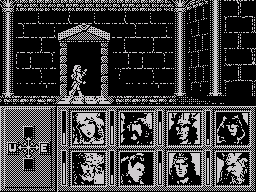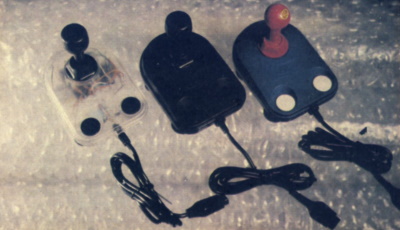FIRE-BREATHING FANTASY
ADVANCED DUNGEONS and Dragons are leaping the commercial
chasm into computer games. Under license from TSR, Strategic
Simulations Inc. are to release several games based on AD&D game
modules. Drawing on the Dragonlance and the even newer Forgotten Realms fantasy
settings, the games will combine the traditional TSR role-playing rules with
arcade action. There’s even the possibility that SSI may be able to
design a completely new module for the as yet relatively undeveloped Forgotten
Realms world.

The only official computerised version of AD&D
The demands of this sort of complexity are high and some of the games,
including a Dungeon Master Assist program, won’t be available for the
Spectrum. Heroes Of The Lance, however, will. Derived from the first
Dragonlance module, Dragons of Despair, the episode charges you with the task
of recovering the precious Disks of Mishakal which are hidden deep within the
treacherous ruins of the temple Xak Tsaroth and guarded by the ancient black
dragon, Khisanth. You control eight companions, whose different attributes and
skills must be exploited to counter the powerful magic that defends the temple,
defeat gigantic spiders and parry with the skeletal undead.
Possible cross-promotions may include discount offers on the glossy TSR
books which accompany the modules. The first SSI AD&D releases
should be available by the end of this year.
NEW JOYSTICK RANGE
BACK IN CHRISTMAS 1987 PowerPlay launched the
terribly successful Cruiser Original — complete with red ergonomic shaft,
blue casing and white buttons. (In fact we’ve had a few in the CRASH
office for ages, and none them have conked out!) But now, for the trendier
games player, there’s two new sticks. Both of them still feature the
innovative sensitivity setting (just lift the shaft and turn for sensitive,
normal or firm play — saves many a sore wrist). Cruiser Black has a flat
top shaft, as opposed to the rounded Original, and a set of ultra tough
microswitches that should last ages. It, like the tough Original, is priced at
a very competitive £9.99.
And if those two still don’t suit your needs, there’s also a
Clear version so you can see exactly what’s going on inside the robust
plastic casing. The Cruiser Clear also has a special bit of wizzo hi-tech
gadgety which autofires when either of the two buttons are held down. The
Cruiser Clear is worth an extra three pounds, at £12.99. Nick Roberts
tells us, it’s improved his street-cred no end! All three Cruisers are
available from PowerPlay.
AMSTRAD IN 16-BIT LAUNCH

Alan Sugar: watching the rest to produce the best
AFTER MONTHS of speculation and rumour, CRASH can safely
say that Amstrad are producing a 16-bit computer, although not a Spectrum. The
new machine, at the moment called the Sinclair Professional is expected to be
launched at the PC Show in mid-September as a £299 package. It is expected
to be a direct rival to Commodore’s Amiga and Atari’s ST.
At £299 it would seem very unlikely that Amstrad are to include a
monitor but would, like Atari, allow a great room for expansion. Amstrad have
already commissioned software for bundling with the release — GO! are
duplicating 100000 copies of a four game compilation, consisting of
Bedlam, Wizard Warz, Trantor — The Last
Stormtrooper and Pitstop II. This suggests Amstrad are aiming
directly at the entertainment sector. News that the Sinclair Professional PC
will have a 3½" disk drive (apparently the contract is for 10000 drives a
month) fuels speculation that the machine could easily be moved into the
business sector at a later stage — although Amstrad rarely produce two
model ranges for one niche; the PC1512s and PC1640s already fill the mid-range
(business AND entertainment) area of computing.
As the name suggests the new machine will be at least partly PC-compatible,
thus also competing with the recently price-cut Commodore PCI. The tougher
3½" drive seems to be the way forward for Amstrad, after their go-it-alone
policy with the 3" disk proved too expensive for software producers. The
Spectrum+ and all, bar the PC-compatible, Amstrads use the 3" standard.
However, their last release, the portable PPC640, used the 3½ disk for the
first time.
To get rid of old 3" disk stock it seems like Amstrad will be putting
together a large (50–100 games) compilation to bundle with the + at
Christmas.
As with all of their releases Amstrad are silently optimistic. We can but
wait and see.
THE NATIONAL COMPUTER GAMES CHAMPIONSHIPS PROGRESS REPORT
The National Computer Games Championship is sponsored by US Gold
in association with the National Association of Boys Clubs and the Personal
Computer Show and organised by Newsfield Limited, publishers of CRASH, ZZAP! 64
and THE GAMES MACHINE. We gratefully acknowledge the kind assistance of British
Rail, the British Airports Authority, Dixons for supplying the Spectrum +3s and
monitors, Commodore (UK) for supplying the Commodore 128s and monitors, and
Konix for the joysticks. And thanks to the staff and members of the local Boys
Clubs for all their help and patience!
As 15 Spectrum qualifiers, from Scotland, Wales/South West and
The Midlands heats, already held, sit back and relax their wrists, ready to
renew battle on August 15 and 18 more contestants bash away on their favourite
games in anticipation of the London/South East and The North heats. In the
meantime we take a look at the action and results of the heats already
held.
First, then, we travel to that silvery-grey city, often referred to as
‘the Athens of the North’, in the company of Mark ‘da
Vinci’ Caswell.
EDINBURGH
Saturday June 11
The start of the National Computer Games Championship began in
earnest at the first venue, Fet Lore Boys Club in Edinburgh.
Each of the contestants was given ten minutes practice to improve on their
finely-honed skills, before the competition began. The game at this Scottish
qualifying heat was US Gold’s 720°, the rules of battle were simple:
one game only with ten minutes in which to play. No second chance.
Spectrum gamesters began, skateboards moving at breathtaking speeds and some
truly incredible, near fatal, stunts were performed to get those vital
points.
The pace hotted up as Stephen Smithwhite took up the challenge and
promptly set the score to beat of over 138000. Could it be beaten? The answer
looked like ‘yes’ as Stuart Campbell and Brian
Wardlaw took up the challenge, the battle raging on between both players as
they passed the 100000 mark with moderate ease. But sadly for them both,
Stephen’s score proved too high to reach, the last few grains of sand in
the digital hourglass ran out, leaving Stuart on just under 110000 and Brian
close behind with over 103000. Formidable scores nevertheless.
We congratulated the winners and other semi-finalists, and commiserated with
the losers. In the end, though, all went away with prizes for their valiant
service.
Spectrum qualifiers for the semi-finals to be held in Manchester
| Stephen Smithwhite (winner) | 138660 |
| Stuart Campbell | 109310 |
| Brian Wardlaw | 103250 |
| Mark Smithwhite | 84270 |
| William Bann | 53500 |
NAILSWORTH
Saturday June 18
A week later, and the action moved south (Nailsworth Boys Club
in Gloucestershire, to be exact), the adjudication this time in the competent
hands of Dominic Handy.
All the way from Swansea came Michael Deer, a timid fellow in
construction, who placed his gifted frame in front of the Spectrum +3. Others
had six or seven practice games, but he needed only one (which he didn’t
even finish). As the ten-minute battle commenced, the two contestants aside
young Deer fell by the wayside but Michael continued to the end, clocking up a
magnificent 2324130 points, compared to the 30000 of his fellow
contestants.
It was not over, though. Up stepped a very confident looking Mark
Sevill from Newent, scoring 230740; not bad for a virgin fighter. You
either had the knack or you didn’t, these two guys certainly did —
no others came close.
Spectrum qualifiers for the semi-finals to be held in London
| Michael Deer (winner) | 232480 |
| Mark Sevill | 230740 |
| Philip White | 168410 |
| Justin Pearson | 157210 |
| Paul Burridge | 152300 |
BIRMINGHAM
Saturday July 2
Just a fortnight on, at the Highgate Sport & Leisure complex
in Birmingham, the third set of qualifying heats got underway. This time it
was Nick Roberts’s chance to show how you can adjudicate with a stopwatch
in one hand and a pizza in the other...
Yet again, they came from far and wide, with Leicester providing a mound of
talent. This time, to the delight of the competitors, the US Gold entourage
unveiled the recently Smashed game Bionic Commando. They all seemed to
like the practise games, and confidence was running high. But the real thing is
a completely different matter.
As expected the scores were close, but no one was prepared for the
nail-biting contest which developed. Up stepped Simon Hadlington from
Stourbridge who proceeded to shoot and swing his way to a very credible 34300.
Pretty good, but Gavin Cavendish from Groby in Leicester gave Simon the
fright of his life with a score of 34280.
Just as everyone thought the contest was over a very smug (he’d just
come second in the Commodore section) Paul Mellerick from Leicester
stepped up. With Konix joystick in one hand and bionic arm in the other he
notched up an amazing 35990! Phew, enough to make Nick drop his pizza!
Spectrum qualifiers for the semi-finals to be held in London
| Paul Mellenck (winner) | 35990 |
| Simon Hadlington | 34300 |
| Gavin Cavendish | 34280 |
| Adrian Grubb | 27240 |
| Trevor Mullen | 12010 |





